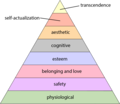Maslow's hierarchy of needs
Maslow's Hierarchy of Needs is a psychological theory proposed by Abraham Maslow in his 1943 paper "A Theory of Human Motivation" in Psychological Review. It is a theory in psychology that ranks human needs in the form of a pyramid with five levels. The lower levels are made up of basic needs, while the upper levels comprise psychological and self-fulfillment needs. Maslow's theory suggests that the most basic level of needs must be met before the individual will strongly desire (or focus motivation upon) the secondary or higher-level needs.
Levels of the Hierarchy[edit]
The hierarchy is traditionally divided into five levels. From the bottom of the hierarchy upwards, the needs are: physiological, safety, love and belonging, esteem, and self-actualization.
Physiological Needs[edit]
These are the physical requirements for human survival. If these requirements are not met, the human body cannot function properly and will ultimately fail. Physiological needs include:
Safety Needs[edit]
Once an individual's physiological needs are satisfied, the need for safety will become emergent. Safety and security needs are about keeping oneself safe from harm. These needs include:
- Personal security
- Financial security
- Health and well-being
- Safety net against accidents/illness and their adverse impacts
Love and Belonging[edit]
After physiological and safety needs are fulfilled, the third level of human needs is social and involves feelings of belongingness. The need for interpersonal relationships motivates behavior. Examples include:
Esteem[edit]
All humans have a need to feel respected; this includes the need to have self-esteem and self-respect. Esteem presents the typical human desire to be accepted and valued by others. There are two types of esteem needs:
- First is self-esteem which results from competence or mastery of a task.
- Second is the attention and recognition that comes from others.
Self-Actualization[edit]
The highest level of Maslow's hierarchy of needs is self-actualization. Maslow described this level as the desire to accomplish everything that one can, to become the most that one can be. Individuals may perceive or focus on this need very specifically. For example, one individual may have a strong desire to become an ideal parent. In another, the desire may be expressed athletically, artistically, or in many other ways.
Criticism and Applications[edit]
While Maslow's hierarchy of needs has been widely adopted in both psychology and business, it has also faced criticism. Some critics argue that the hierarchy is too rigid and does not account for cultural differences or the possibility that individuals may prioritize needs differently based on personal or situational factors. Despite these criticisms, the hierarchy remains a popular framework for understanding human motivation and has been applied in various fields, including education, healthcare, and management.
See Also[edit]

This article is a psychology-related stub. You can help WikiMD by expanding it!
-
Maslow's hierarchy of needs
-
Maslow's hierarchy of needs
-
Maslow's hierarchy of needs
Ad. Transform your life with W8MD's Budget GLP-1 injections from $75


W8MD offers a medical weight loss program to lose weight in Philadelphia. Our physician-supervised medical weight loss provides:
- Weight loss injections in NYC (generic and brand names):
- Zepbound / Mounjaro, Wegovy / Ozempic, Saxenda
- Most insurances accepted or discounted self-pay rates. We will obtain insurance prior authorizations if needed.
- Generic GLP1 weight loss injections from $75 for the starting dose.
- Also offer prescription weight loss medications including Phentermine, Qsymia, Diethylpropion, Contrave etc.
NYC weight loss doctor appointmentsNYC weight loss doctor appointments
Start your NYC weight loss journey today at our NYC medical weight loss and Philadelphia medical weight loss clinics.
- Call 718-946-5500 to lose weight in NYC or for medical weight loss in Philadelphia 215-676-2334.
- Tags:NYC medical weight loss, Philadelphia lose weight Zepbound NYC, Budget GLP1 weight loss injections, Wegovy Philadelphia, Wegovy NYC, Philadelphia medical weight loss, Brookly weight loss and Wegovy NYC
|
WikiMD's Wellness Encyclopedia |
| Let Food Be Thy Medicine Medicine Thy Food - Hippocrates |
Medical Disclaimer: WikiMD is not a substitute for professional medical advice. The information on WikiMD is provided as an information resource only, may be incorrect, outdated or misleading, and is not to be used or relied on for any diagnostic or treatment purposes. Please consult your health care provider before making any healthcare decisions or for guidance about a specific medical condition. WikiMD expressly disclaims responsibility, and shall have no liability, for any damages, loss, injury, or liability whatsoever suffered as a result of your reliance on the information contained in this site. By visiting this site you agree to the foregoing terms and conditions, which may from time to time be changed or supplemented by WikiMD. If you do not agree to the foregoing terms and conditions, you should not enter or use this site. See full disclaimer.
Credits:Most images are courtesy of Wikimedia commons, and templates, categories Wikipedia, licensed under CC BY SA or similar.
Translate this page: - East Asian
中文,
日本,
한국어,
South Asian
हिन्दी,
தமிழ்,
తెలుగు,
Urdu,
ಕನ್ನಡ,
Southeast Asian
Indonesian,
Vietnamese,
Thai,
မြန်မာဘာသာ,
বাংলা
European
español,
Deutsch,
français,
Greek,
português do Brasil,
polski,
română,
русский,
Nederlands,
norsk,
svenska,
suomi,
Italian
Middle Eastern & African
عربى,
Turkish,
Persian,
Hebrew,
Afrikaans,
isiZulu,
Kiswahili,
Other
Bulgarian,
Hungarian,
Czech,
Swedish,
മലയാളം,
मराठी,
ਪੰਜਾਬੀ,
ગુજરાતી,
Portuguese,
Ukrainian


